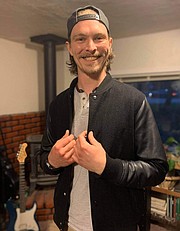The Tim Project
PATTY HUTCHENS / Contributing Writer | Bonner County Daily Bee | UPDATED 1 year, 8 months AGO
To others, it appeared that Tim Prummer did not have a care in the world.
Growing up in Sandpoint, Tim had the love and support of his parents, siblings, and his community. Many knew Tim as a successful runner on the Sandpoint High School cross country and track and field teams where his extraordinary leadership skills landed him the role of team captain. Tragically, Tim passed away late last year at the age of 28.
“Tim was always encouraging others and had a desire to help those who were less fortunate,” said Tim’s mom, Kathy Prummer. “He also had an amazing sense of humor.”
Tim’s brother Jeremiah shares that his younger brother was dynamic and charismatic. “Anytime he walked into a room, the mood would lift,” he said.
Perhaps that sense of humor and charisma were why people did not see the challenges Tim had faced for most of his life. According to Kathy, Tim was hindered by his brain from an early age. Despite being introspective, intellectual, and a good communicator, Tim was challenged academically. Tim also had sleep issues and struggled with anxiety.
“He often told me that no one knew what it was like to live inside his brain,” said Kathy, adding that although Tim began to show signs of mental and emotional difficulties in high school, he seemed to be able to keep that all in check as long as he was running.
As Tim grew older, his struggles increased. Like many, he turned to drugs and alcohol to calm the noise, reduce stress, and assist with sleep. Despite counseling and going through rehabilitation, Tim tragically died of an accidental drug overdose in November of last year leaving his family, friends, and community devastated.
Jeremiah shares that despite Tim’s struggles, he was on the way to becoming who he always wanted to be in the months leading up to his death. Kathy agrees.
“In his last six months or so, Tim began to work to heal his relationships, and we were very hopeful that he was going to be healed of his addiction,” Kathy said. “He was living in a homeless transition shelter and had kept a job for over a year. His boss was training him to manage the convenience store where he was working. It all looked like he was moving in the right direction.”
“He was eating healthier, getting counseling, and growing,” added Jeremiah. “Most importantly, he was rebuilding relationships he’d damaged.”
In Tim’s memory, Tim’s dad Gregg and his wife Shawna along with Tim’s mom Kathy are funding a unique treatment for others who struggle with addiction. Named in honor of their son, The Tim Project will involve treatment with Dr. Linda Larson, founder of North Idaho Neurotherapy in Sandpoint who specializes in psychological health, wellness, and mind-body physiology. She and her team have made a difference in many lives of those who suffer from addiction, depression, traumatic brain injuries, and more.
The treatment begins with administering a non-invasive, quantitative EEG brain map that allows them to measure, analyze, and quantify brainwaves.
"We have the capability to not only see the brainwaves under different situations, but we can also see the relationship of the brainwaves to one another, look at the symmetry of the brain, the stability of brainwave relationships, and areas where the brain may be generating signals that may be manifesting itself in problematic symptoms and behaviors," explained Dr. Larson.
Once all of the data is interpreted, a treatment plan can be executed.
“Treatment in our clinic involves neurostimulation, which is often referred to as neuromodulation, and is what makes us unique from other neurofeedback providers,” said Dr. Larson.
Research has shown that neurotherapy combined with regularly-attended programs can make a significant difference for an addict.
“Tim was a victim of the brain he had, and I firmly believe he would still be here living toward his potential if he would have gone through brain treatment,” said Kathy. “After Tim's death, I had a total of five quantitative EEGs and 60 brain treatments. My brain is in a completely different place because of it. And so would Tim's have been.”
Gretchen Steen, owner of Alcohol and Drug Counseling and Recovery Services in Sandpoint, and Debbie Busch, who works at Kaniksu Health as the lead of their addicts’ program, will review each candidate before referral to North Idaho Neurotherapy. To qualify, the applicant must be committed to staying clean and attending all appointments.
Once referred to North Idaho Neurotherapy, the applicant for the Tim Project will meet with Dr. Larson or one of her team members for a consultation. Following will be a quantitative EEG assessment by neurotherapy clinician John DeWig, MS followed by a review of the results.
Treatment will involve accelerated sessions which take place twice a day. The treatment will involve 15 sessions which will take place over 10 days and will be followed by a post-QEEG assessment.
“From there, we will determine if additional sessions are needed,” said Larson.
Gregg agrees that Tim he was one of the most charismatic people he has ever known, but he often frustrated Gregg as well.
“I could not understand why he would make the decisions that he did, but because of the work Linda is doing with brain mapping I now have a much better idea why he made those decisions,” said Gregg, adding that in the end, tough love or rehabilitation did not work for Tim.
“Tim had made big improvements over the last months of his life and was taking personal responsibility for his actions but he still struggled with his decisions. Brain mapping very well may have been the last tool he needed for stability in his life,” said Gregg.
Knowing what Tim struggled with each day, Gregg, Shawna, and Kathy are committed to The Tim Project in the hope that they can make a difference in others’ lives who struggle with addiction.
“Tim would be proud of us for working together to create this project. We believe this will be the key, in addition to counseling and spiritual support, to help heal others with addictions,” said Kathy. “We don't ever want Tim's death to be in vain. We know Tim was chosen for this life and that in his death, God will continue to work all things together for good.”
One thing Jeremiah wants everyone to know is that Tim wanted to be alive. “It was not suicide. He loved all his friends and family so much, and wanted to be here,” he said.
To learn more about The Tim Project, contact North Idaho Neurotherapy at 208-255-6057.









